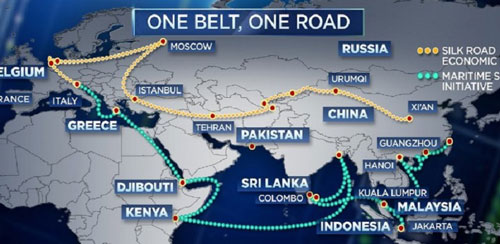Shah Fahad
NAPOLEON Bonaparte once said, “China is a sleeping giant, let her sleep, for when she wakes she will move the world”. Napoleon foresaw the future which no one else could at that time. Now a country home to more than 1.3 billion people, the second-biggest economy of the world with a GDP of more than $14 trillion is none other than China. Recently it came to a halt due to the Coronavirus outbreak. Notably, a country with so much population managed to control the outbreak by taking effective measures is applaudable, although the damage to the economy has been done due to little or no production which will directly impact the Belt and Road Initiative (BRI). Many experts around the world have been suggesting that this outbreak will jeopardize the years of economic diplomacy and billions of dollars’ worth of projects. There is no doubt BRI will change the landscape of power in the world forever. After a very long time, a new power could emerge, this time not from the West. Since the initiative isn’t confined to China only, projects with other partner countries like Indonesia which, at the time of writing this article, has the highest death rate because of the Coronavirus will also be put on hold for some time.
The global power players have always criticized the project, either calling it too ambitious or portraying it as a plan to control weaker neighbouring countries. President Xi Jinping’s intentions are also castigated, external forces motivate people from partner countries to revolt against the project. IMF commented that projects like CPEC will put Pakistan under financial stress later on. The White House issued several statements that the CPEC, crown Jewel of the BRI, will bring no fruit to Pakistan but China. This is a very interesting statement coming from a country that has a history of war and financial crimes.
From a neutral perspective, some projects indeed got cancelled or delayed, the GDP growth has slowed over the years due to the trade war between Washington and Beijing but that does not show weakness. Experts are skeptical, whether China will be able to achieve the targets or not. I don’t agree with this assessment because this is the biggest project of Beijing and it’s a leap forward, it will define the future of China and partner countries specially Pakistan. If the contracts are being cancelled or delayed that does not mean initiative is getting weaker. Challenges increase significantly when there are so many countries involved, which is a natural phenomenon.
Historically China’s economy has suffered many ups and downs but always emerged triumphant. In 1992 the GDP of the Communist country was $427 billion which skyrocketed to $1.4 trillion in 2002. The poverty headcount in 2010 was 17.2% which over the years has come down to 3.1% in 2017. The Gross National Income of the socialist country was just $1.4 trillion in 1992 which has increased to the level of $23.24 trillion in 2017, which is higher than the US. In 2017 Beijing spent about $280 billion on research and development. China is set to become the largest nuclear power producer by 2030. A country with a history of back to back revolutions and bloodshed, putting up the competition to the West in a matter of few decades is a clear indication that Beijing is not only capable to recuperate from this setback but can also refocus of BRI including its crown jewel CPEC.
The experts are suggesting that after the virus, China will have to shift all of the attention to the rehabilitation of their economy and the flow of funds to BRI will be stopped. This is a valid assessment to some extent but the rate of economic growth that the People’s Republic has shown from being nothing to the world’s second-largest economy, the doubts are very little that they will have a hard time restarting. China’s central bank has issued $26 billion as a re-lending quota and has advised banks to support consumer credit. After every crisis, the demand always increases, with the People’s Republic Bank’s active measures the situation will be normalized sooner than expected. The orders that got cancelled due to non-activity in the socialist country are indeed a loss to the economy but the price and technological competitiveness have not eroded with the virus.
Bloomberg reported that Zhang Baozhong, Chairman of China Overseas Ports Holding co, dismisses the claims that the activity in CPEC has been reduced. He says that it will take some time but after the completion of the project, the Gwadar Port will be the economic hub of Pakistan. In the same report Naseer Kashani, Chairman of the Gwadar Port Authority said, “They talk about CPEC slowing down, but nothing is slowing down”. The other propaganda is about the security of the area, fears about BLA. Pakistan arrested the Indian spy who confessed about India’s involvement in the region to destabilize it. Over the years the security situation throughout the country has improved tremendously due to tireless efforts of your military and intelligence agencies, increased tourism is an example of their efforts.
Mainstream international media criticize BRI but their criticism has less reality and more propaganda in it. Over the years many countries have shown interest to be part of the grand project including Iran. If the initiative is flawed then why are the power players upset about it? Economic cooperation helps everyone grow while benefiting from each other. Economically weaker countries in the EU have always benefitted from the stronger countries like Germany and former member Great Britain. It helps achieve economic targets that look impossible to achieve individually. The economic cooperation also brings peace in the region, which this region has a dire need of.
—The author is a Karachi-based freelance journalist.









